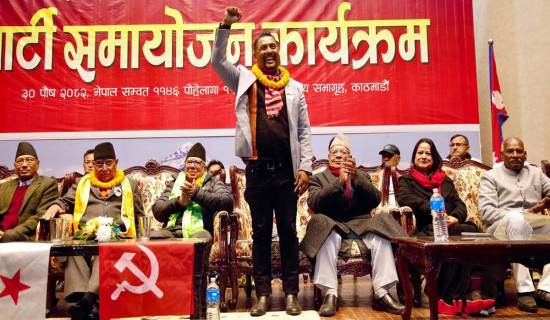- Wednesday, 14 January 2026
Heed Environment
It might not be obvious and it is certainly not comfortable to think about but Nepal is in the midst of quite an environmental mess and nowhere is this more evident than in the capital city Kathmandu. The rivers here are dead, garbage covers the streets and intersections and the air is heavy with pollution. Our country is arguably fast becoming uninhabitable, just like the rest of the world. So perhaps now is the time to rethink our ways and get real about sustainable environmental protection. The path we are currently on leads to nothing but death and destruction so we must now change it starting with our dependency on fossil fuels.
Let’s get real. We cannot completely eliminate fossil fuels from our lives, at least not immediately. But what we can and should do is gradually move away from it.
Taking baby steps like using electrical stoves or ovens instead of liquified petroleum gas to cook or using electric scooters or bicycles to travel short distances can go a long way in reducing our consumption of oil which would be better not just for the environment but for our own wallets as well.
The price of oil is at an all-time high and trips to the petrol pump have become eye-wateringly expensive. This should incentivise us to use renewables, which in our case is hydroelectricity, which are cheaper than fossil fuels.
Hydropower can massively reduce our reliance on imported oil but only if the sector is supported by good policies and investment. Currently, many fear quitting oil and oil-based fuel because electricity is not reliable. There are frequent unannounced power cuts, even in the urban areas and our grids get easily overloaded. While promoting electricity use, we need to simultaneously work on overhauling and modernising its infrastructure and expanding people’s access to it by introducing various schemes. We can seek the help of international partners for this.
At the same time, we must also look for possibilities in the wind and solar sectors.
Another thing we can do to reduce environmental degradation is to utilise our resources and not exploit them. The word ‘exploitation’ carries with it a negative connotation of using something until there is no more left. Utilisation, on the other hand, indicates using something practically and efficiently, ensuring that the source is not depleted or destroyed. Economist Kenneth Boulding called this concept “moving from a cowboy economy to the spaceman economy” in 1966.
Cowboys in the “wild west” of the United States were known for settling in an area, exhausting the resources there to rear their cattle and then moving on to another area and doing the same. Boulding criticised this behaviour and called on all to act like astronauts who use and reuse many things in many innovative ways to make the most out of the limited resources they have in space.
Transparency is another way we could combat pollution. After all, the people do not want the contamination of their water and the poisoning of their air. The average citizen has always stood in favour of environmental conservation. It is only a select few that benefit from destruction and that work to influence the decision-makers.
Making governance transparent would prevent unethical partnerships between these forces and those in power and ensure that states’ environmental policies are actually focused on protecting the environment for the health of the people.
After all, it is the right of every man, woman and child to live in a clean country and a clean world. In the case of our own country, the constitution gives every person the right to life and the right to health, both of which are intrinsically linked to the environment.
The constitution requires our federal, provincial and local governments to guarantee these rights. It mean they are required to curb pollution, preserve greenery and defend the environment. To allow our communities to become uninhabitable would be, in a way, a violation of the constitution and could be challenged in the courts. Enforcing these rights could change everything.
We have no choice but to change our lifestyle and bring it in harmony with nature. We have to breathe this air, drink this water and live on this soil so destroying them will ultimately destroy us. To change our ways will not be easy but it will also not be as hard as we fear. There is still time, albeit very little and if we work together, we may still be able to save our planet. We need to stop digging our own graves.














